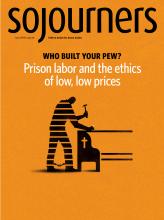WE LIVE IN AN AGE of “market morality”: In our market system, we believe that money grants value and meaning to the moral and social questions of life. It doesn’t. Nevertheless, we’re under its spell.
Market morality interprets life in economic terms. For instance, many corporations do not believe they have a moral duty to vulnerable communities affected by their business practices. Instead, they assert that their primary duty is their fiduciary responsibility to shareholders and other stakeholders in the company. In this case, the moral domain of corporate practice is about securing profit returns to the exclusion of broader social and communal practices of care.
We have witnessed, repeatedly, poor communities and their environments polluted by toxins associated with corporate practices. This is readily seen in the Flint, Mich. water crisis, which persists. These companies offer no apologies, because their moral obligations are defined in economic terms, shaped by the bottom line of profit.
Read the Full Article

